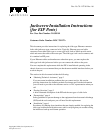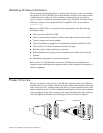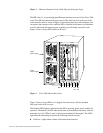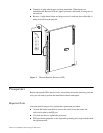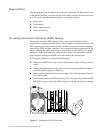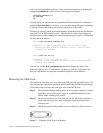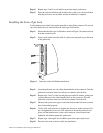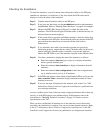
6Jackscrew Installation Instructions (for EIP Ports)
Note: For safety, periodically check the resistance value of the antistatic strap. The
measurement should be within the range of 1 and 10 Mohms.
Installation
The following installation process describes the procedure for shutting down the
interfaces on which you will replace connector locks, removing the slide-type lock
bracket, and installing jackscrews to accommodate screw-type cable connectors.
Note: Although shutting down an interface before replacing the lock is not required,
Cisco Systems recommends that you do so as a precaution to protect the electronic
components in the system and to avoid creating problems on your network.
Shutting Down Interfaces
It is unlikely that interface ports will be enabled if you have not been able to connect
the network interface cables. However, if any of the interfaces are already enabled, you
can avoid potential problems by administratively shutting the interface down and, when
the replacement is complete, enabling the interface again with commands you enter
from the console terminal.
The shutdown interface subcommand disables all functions and prevents all packet
transmission on the interface that you specify with the interface type slot/port
command. The no shutdown interface subcommand turns the interface back on.
Because interface is a privileged-level configuration command, you may need a
password to enable the privileged level of the EXEC command interpreter.
Following is an example session to first enter the privileged level and configuration
mode, and then to specify and shut down each of the first two Ethernet ports (port 0 and
port 1) on an EIP installed in slot 1 of the Cisco 7000. Entering Ctrl-Z saves the
configuration and returns you to the EXEC command interpreter.
Router>enable
Password:secretword
Router#configure
Configuring from terminal, memory, or network [terminal]?
interface ethernet 1/0
shutdown
interface ethernet 1/1
shutdown
^Z



